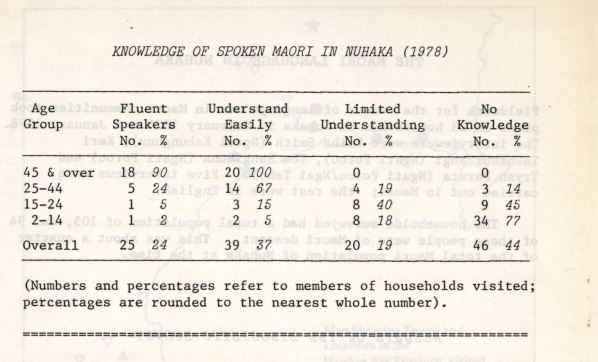-
Ngā Karere me Ngā Rauemi
News and Resources
Ngā Karere me Ngā Rauemi
News and Resources
-
Te Rangaihi Reo Māori
The Movement
Te Rangaihi Reo Māori
The Movement
-
Te Pae Kōrero
Our Community
Te Pae Kōrero
Our Community
-
Huihuinga
Events
Huihuinga
Events
-
Ngā Ara Ako
Learning Pathways
Ngā Ara Ako
Learning Pathways
-
SearchSearch
Search
Search

Two-thirds of the people in the survey had been beaten or picked on by the teachers for speaking Maori as children. This was one of the reasons why, as adults, they spoke mainly English in their homes, and why less than 10 percent of the people under 25 could speak Maori well. Maori was the mother tongue of most kaumatua in Nuhaka, and they were sorry that fewer and fewer young people knew or used Maori. Many parents said that they knew about this, but felt unable to teach their own children. Others believed that Maori was a dead language, and that, in the modern world, it was more important to know English. Two local school teachers agreed, and, although they taught Maori arts and crafts and action songs, they did not seem to be too worried about losing the language of their ancestors. Several parents said that the Maori language must be learned in the home with other skills. This was usually an impossible task, partly because of the competition from television, radio and newspapers, which were mostly in English.
Te Matau-a-Māui | Hawke’s Bay | Wairoa | 1970-79 | 5% of Māori children can speak te reo. (1970-75) | Story is by tangata whenua
















Comments